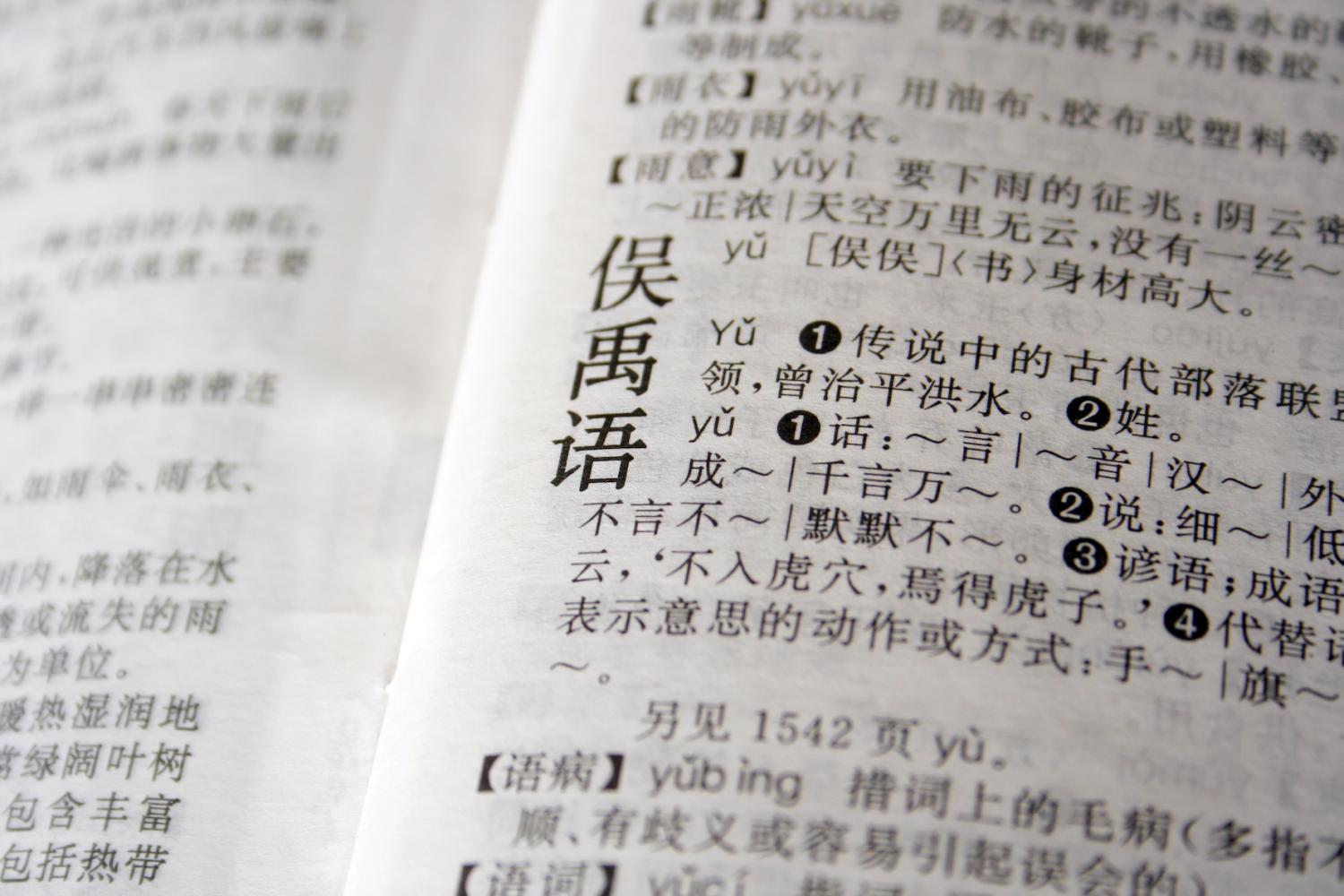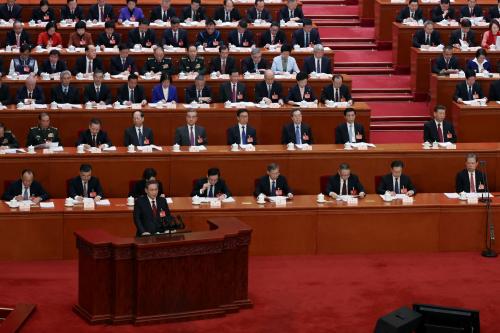This is the seventh essay of Global China’s “Lost in translation: Decoding Chinese strategic narratives” series. The full collection of essays can be found here.
The United States is the only country in the world with both the capability and the intent to significantly shape China’s domestic and external environment. Meanwhile, the president is the most influential actor in U.S. foreign policy. These two factors combine to make the quadrennial presidential election the obsession of Chinese government officials, journalists, academics, and pundits. They try their best not only to predict and explain presidential election results but also to forecast China-U.S. relations over the next four years.
A Shanghai-based Chinese venture capitalist published an op-ed in The New York Times, “How Trump Is Good for China,” shortly after Donald Trump’s upset victory eight years ago. While acknowledging Trump’s fervent China-bashing during the campaign, the author nevertheless argued that “a resolute businessman with little ideological underpinning” is a godsend for China. “Without the shackles of ideology,” he wrote, “even the most competitive rivals can make deals.” He concluded with arguably the most upbeat prediction about China-U.S. relations in the past eight years. “In the long term, Mr. Trump’s America and China are more likely to work with each other than in any other period in recent memory,” he declared.
Less than two years later, the first Trump administration launched a trade war against China. This was followed by the notorious “China Initiative,” visa restrictions for Chinese students and scholars, and executive orders limiting Chinese access to U.S. technology and capital, among other things. To be sure, the bilateral relationship already showed signs of increasing tensions during President Barack Obama’s second term. Yet Trump certainly was responsible for its sharpest downturn since Richard Nixon’s landmark visit to the Middle Kingdom in 1972.
Now that Trump is occupying the White House for another four years, how do Chinese analysts assess the prospects for the world’s most consequential relationship? There is already a large and growing number of informed analyses that try to answer this question, and their sentiment is overwhelmingly pessimistic, punctuated by occasional cautious optimism.
Pervasive pessimism
The overwhelming majority of Chinese analysts strike a decidedly pessimistic tone, particularly because Trump’s first four years leave little room for optimism about the next four years. In his first presidential term, Trump fired the opening shots in a new era of worsening China-U.S. relations: a trade war, the China Initiative, sanctions against Chinese high-tech companies like Huawei, and his harsh criticism of China’s handling of the COVID-19 pandemic, to name a few. Trump’s successor, Joe Biden, also did not give anyone much hope for the bilateral relationship. With a few changes in form, President Biden largely inherited Trump’s China policies in substance, as exemplified by “small yard and high fence.”
Meanwhile, the resurgence of China hawks in Trump’s incoming administration casts a long shadow of pessimism over the prospects of the bilateral relationship. Marco Rubio, Trump’s pick for secretary of state, is one of the most high-profile critics of China in Washington. Michael Waltz, Trump’s choice for national security advisor, also has established himself as a China hawk on Capitol Hill. One analyst, Jia Qingguo, describes the likes of Rubio and Waltz as “extreme realists,” some of whom “harbor strong antipathy and bias against China.” With these China hardliners advising the president, one can hardly expect any positive development in the near future, even though the commander-in-chief will have the final say on China policy.
Along similar lines, two analysts contended that the key to understanding Trump and his China policy is “Make America Great Again” (MAGA), the Trump-led political movement that has framed China as America’s ideological, geopolitical, and economic rival. In these analysts’ view, MAGA represents a clear and fundamental shift in how America sees itself and its relationship with the world—from “benevolent hegemony” to “self-centered hegemony”—and China was both a key driver of this shift and its primary target. In the final analysis, they sternly warned, China should have no illusions about Trump’s supposedly transactional style of decisionmaking; instead, it should prepare itself for a MAGA-centered new reality.
Trump and Biden’s idiosyncratic leadership styles and policy preferences notwithstanding, there appears to be a wide consensus among Chinese analysts and decisionmakers that powerful impersonal forces are driving the two great powers to clash. These include Washington’s unwavering pursuit of global primacy, its deep-rooted antipathy toward communism, and China’s rapidly growing power and influence. “With a narrowing gap between U.S. and Chinese power, Washington has firmly targeted China as its biggest rival,” one commentator asserted, “making any substantive easing of bilateral tensions nearly impossible in the short and midterm.” Put differently, no matter who sits in the White House over the next four or eight years, China will be viewed as America’s existential threat, and strategic competition between Washington and Beijing will only intensify.
Rare optimism
When it comes to China-U.S. relations in Trump 2.0, optimism is the exception while pessimism is the rule. Why are some people still hopeful, when the above-mentioned factors seem to make an irrefutable case for pessimism?
One frequently mentioned reason is Trump’s supposedly transactional style of leadership. This is a different way of saying that Trump seems much more interested in getting things done than lecturing China about lofty-sounding values like human rights and democracy. In a widely circulated post on WeChat, the most popular Chinese social media, a pundit listed 14 reasons why Trump has become the “least anti-China politician” because of his transactional style. “Trump is a strong transactionalist, very flexible, unembarrassed of putting disputes on the table, willing to negotiate on any topic, and keen to cultivate personal relationships,” he wrote. Because the president-elect values “personal relationships rather than rules and principles,” he claimed, “Trump can be manipulated, managed, and leveraged.”
Another frequently cited reason is Trump’s “America First” approach to U.S. foreign policy. Trump is the first “real” U.S. president because of his “Americanness,” wrote one observer, who defined Americanness as “making America Americans’ America” rather than “making America the world’s America.” Americanness will gradually undermine America’s military alliance and global leadership, he wrote, which in turn means reduced strategic pressure for China. Though “America First” could mean higher tariffs for Chinese exports, this should not necessarily be viewed as a bad thing, he argued, because tariffs may force China to speed up supply-side reform, making China not only “the world’s manufacturing center but also the world’s consumer market.”
Some analysts sounded cautiously optimistic that China is better positioned to respond to Trump 2.0. On the one hand, experiences matter. “[Having] navigated the differing strategies of the Obama, Trump, and Biden administrations,” wrote one prominent Chinese international relations scholar, “Beijing has become more adept at managing its competition with Washington.” On the other hand, another analyst suggested in a commentary titled, “Trump’s reelection means disruptive impact? Not necessarily!”, that China’s policy adjustments and America’s declining influence have made China better prepared to weather treacherous waters ahead. His predictions were based on three factors, namely, “America’s decreasing importance in China’s global strategy, the decreased impact of America’s containment of China, and the decline of America’s capability to mobilize domestic and international resources.” In short, China is both more experienced and more capable of handling its relations with the United States.
Chinese analysts’ policy recommendations
While making predictions about China-U.S. relations under Trump 2.0, Chinese pundits—particularly those from the pessimistic camp—also offer a wide range of policy recommendations. Nearly all these recommendations focus on what China should do at home to strengthen itself, rather than what it should do abroad to weaken its competitor. Put differently, Chinese observers’ underlying logic is in line with a Chinese aphorism: “To forge iron, one must be strong oneself.”
A large number of recommendations advise the Chinese government on its trade and economic policies, due to Trump’s repeated threats to launch a second trade war against China and the vital importance of China-U.S. economic ties to the Chinese economy. The most frequently proposed policy is to boost domestic demand by all means possible. To achieve this goal, according to one article, Beijing should distribute consumer coupons, simplify approval for foreign direct investment, and stabilize the stock market to increase household income. Three economists at a leading Chinese think tank also urged Beijing to actively increase domestic demand and speed up the growth of its domestic market, to decrease dependence on the overseas market.
Another frequent recommendation is to foster technological innovation, arguably the most important source of economic growth for any human society. “To actively deal with the risk of supply chain ‘de-coupling’ by the United States,” admonished a group of economists, China should accelerate “industrial upgrading and hi-tech self-sufficiency.” Meanwhile, some analysts called for favorable policies that “encourage investment in hi-tech industries so as to facilitate a benign circulation between technological innovation and industrial development.”
In addition to the economic front, some pundits also offer diplomatic advice. “China should send friendly signaling to China-related ‘stakeholders,’ including U.S. financial sectors, agricultural states, the scientific community, NGOs, and local government,” advised a prominent commentator. “As long as there is sufficient profit to be reaped from China,” he added, “U.S. capital will not abandon the China market.” He also called for paying close attention to “Trump’s peculiar style of foreign policy-making,” one that “worships the strongman … demands ‘respect’ from foreign leaders.” He suggested that “new thinking in China’s U.S. policy should be established because Trump prioritizes ‘transactions,’ whose underlying logic is business deal-making.” As a result, he wrote, “China should view China-U.S. relations more from the economic perspective rather than from other perspectives.”
Predicting the unpredictable
When Trump won his first election, it was popular to say that the only certainty about his presidency was uncertainty. Eight years later, the same saying still holds true. In so far as China-U.S. relations are concerned, he has already demonstrated his idiosyncratic unpredictability by reportedly inviting Chinese President Xi Jinping to attend his inauguration ceremony, an unprecedented diplomatic move. Who knows how many more predictions Trump will prove false in the next four years?
That being said, given Trump’s track record on China and the inherent tensions between the United States and China, most Chinese analysts are justifiably pessimistic about the bilateral relationship. Only a handful of them sound optimistic, and a key reason for their optimism is Trump’s perceived transactionalism. But being transactional does not necessarily mean that it is easy to make a deal with the so-called master dealmaker, as Trump’s first term has clearly shown. On the contrary, a transactional leader could simply be a racketeer, who produces (or threatens to produce) a danger and, at a price, provides a shield against that danger. By threatening to impose a 60% flat tariff on Chinese exports, for example, Trump has set in motion something that may look to some like a racketeering scheme. A transactional Trump may have no interest at all in waging an ideological crusade against China, but he could do as much—if not more—harm to the bilateral relationship as a die-hard ideologue, as amply illustrated by his first tenure.
To borrow from Yogi Berra, it’s tough to make predictions, especially about the notoriously unpredictable. While nobody has a crystal ball, one thing is predictable. The study of the United States will gain added urgency and importance in China. It is arguably the worst time for China-U.S. relations, but it is certainly the best time for the study of the United States.
The Brookings Institution is committed to quality, independence, and impact.
We are supported by a diverse array of funders. In line with our values and policies, each Brookings publication represents the sole views of its author(s).







Commentary
What do Chinese analysts expect for China-US relations under Trump 2.0?
January 23, 2025